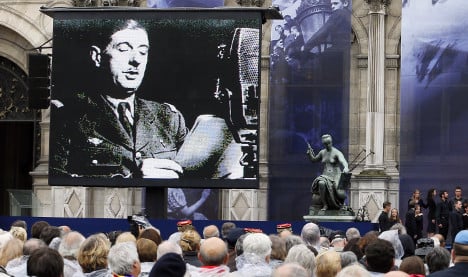French leaders have been criticized on Thursday for appearing to snub the 200th year anniversary of the Battle of Waterloo.
But as the country’s Defense Minister Jean-Yves Le Drian pointed out, there is “another historic” event that needs to be acknowledged on Thursday and one that is slightly easier perhaps for the French to reminisce about.
On June 18th 1940 as the French government prepared to make peace with Hitler’s invading army, Charles de Gaulle took to the airwaves to broadcast an appeal to his French people via the BBC.
De Gaulle, the leader of the Free French Forces based in London, told his countrymen that the war was not over.
The speech, actually had to be rebroadcast on June 22nd because technical problems meant very few French people actually heard it.
And it also failed to have an immediate impact with many French soldiers who were with De Gaulle in the UK subsequently returning to France
Nevertheless De Gaulle's words were considered extremely influential, and were repeated throughout the war to inspire the French people to rise up against their occupiers.
For that reason the speech was considered to be the start of the French Resistance against the Nazis.
Although it came at a dark time in French history, De Gaulle’s speech, simply known in France as the Appeal of June 18th, is celebrated with pride.
On Thursday, President François Hollande headed to Mont-Valérien, a hill just outside Paris that was used by the Nazis for executions during the war, to commemorate the appeal along with the mayor of Paris Anne Hidalgo and Britain’s ambassador Sir Peter Ricketts.
He was also accompanied by several survivors of the Resistance.
Although there is no recording of De Gaulle’s original speech the second one from June 22th still remains (see video below).
Here is a section from De Gaulle’s famous appeal:
“Honour, common sense, and the interests of the country require that all free Frenchmen, wherever they be, should continue the fight as best they may.
“It is therefore necessary to group the largest possible French force wherever this can be done. Everything which can be collected by way of French military elements and potentialities for armaments production must be organised wherever such elements exist.
“I, General de Gaulle, am undertaking this national task here in England.
“I call upon all French servicemen of the land, sea, and air forces; I call upon French engineers and skilled armaments workers who are on British soil, or have the means of getting here, to come and join me.
“I call upon the leaders, together with all soldiers, sailors, and airmen of the French land, sea, and air forces, wherever they may now be, to get in touch with me.
“I call upon all Frenchmen who want to remain free to listen to my voice and follow me.
“Long live free France in honour and independence!”



 Please whitelist us to continue reading.
Please whitelist us to continue reading.
Member comments